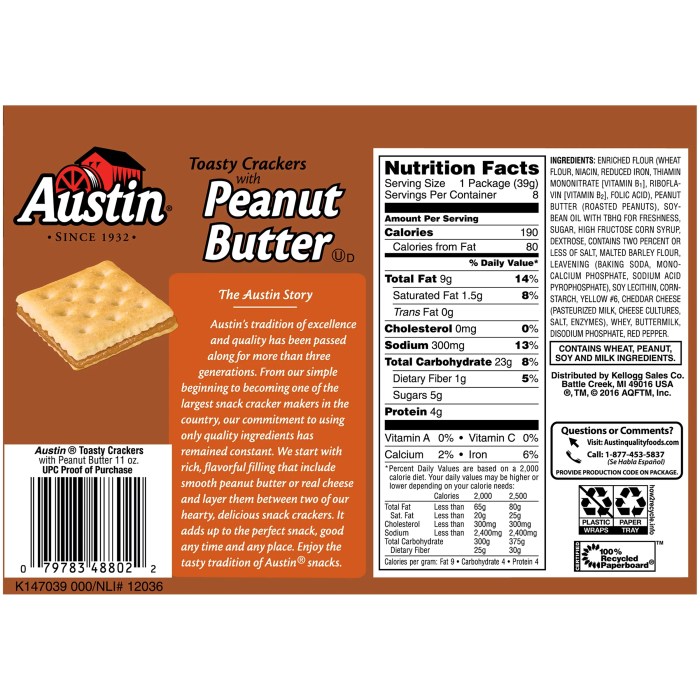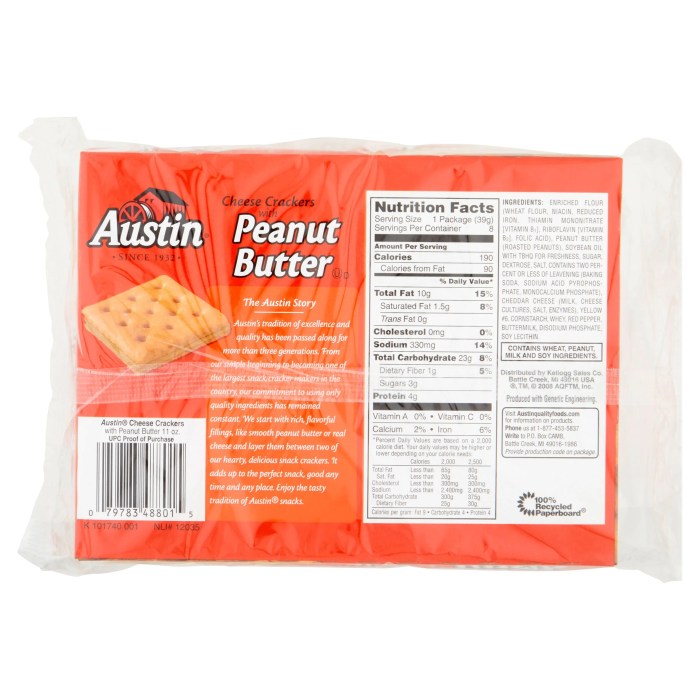Ingredient Variations and Nutritional Differences: Cheese Peanut Butter Crackers Nutrition

Cheese peanut butter crackers nutrition – The seemingly simple cheese peanut butter cracker holds a surprising depth of nutritional variability, depending on the specific ingredients used. Small changes in the cracker base, the type of cheese, and the amount of peanut butter can significantly alter the overall nutritional profile, impacting everything from fiber content to fat and protein levels. Understanding these variations allows for informed choices based on individual dietary needs and preferences.
The Impact of Cracker Type
The foundation of our cheese peanut butter cracker dictates much of its nutritional character. Whole wheat crackers, for example, boast a higher fiber content compared to their refined counterparts, contributing to improved digestive health and increased satiety. Multigrain crackers, with their blend of grains, often offer a broader spectrum of vitamins and minerals, enhancing the overall nutritional value.
In contrast, crackers made from refined white flour tend to be lower in fiber and essential nutrients, offering primarily carbohydrates and calories. The choice of cracker type directly influences the overall fiber, vitamin, and mineral content of the final product.
The purported health benefits of cheese peanut butter crackers, often touted as a convenient snack, are easily undermined by a closer look at their nutritional profile. A significant portion of their caloric content comes from saturated fat and added sugars, a fact often ignored in marketing. Consider, for instance, the stark contrast when comparing this to the often equally unhealthy, yet more transparent, cream cheese nutrition facts , which at least openly declares its high fat content.
Ultimately, both options highlight the deceptive marketing strategies employed by food companies pushing processed “convenience” foods, obscuring the true nutritional cost of these supposedly simple snacks.
Cheese Selection: A Nutritional Crossroads
The cheese component significantly impacts the fat and protein content of the cracker. Full-fat cheese adds richness and flavor, but also contributes a higher amount of saturated fat and calories. Reduced-fat cheese, on the other hand, offers a lower calorie and fat option, but may compromise slightly on flavor and creaminess. The choice between full-fat and reduced-fat cheese represents a trade-off between taste and health considerations.
For example, a cracker using cheddar cheese will have a different nutritional profile compared to one using a lower-fat alternative like part-skim mozzarella.
Peanut Butter Proportion: A Balancing Act
The quantity of peanut butter incorporated also plays a crucial role. A higher peanut butter content increases the overall calorie, fat, and protein levels, while simultaneously boosting the healthy fats and potentially providing more fiber depending on the type of peanut butter used (e.g., natural peanut butter vs. processed peanut butter with added sugar and salt). Conversely, a lower peanut butter content results in a cracker with fewer calories and fats but potentially less protein and flavor.
Finding the optimal balance depends on individual preferences and dietary goals.
Nutritional Composition Comparison Table
| Ingredient Variation | Calories (per serving) | Fat (grams per serving) | Fiber (grams per serving) | Protein (grams per serving) |
|---|---|---|---|---|
| Whole Wheat Cracker, Reduced-Fat Cheese, Low Peanut Butter | 100 | 3 | 2 | 4 |
| Multigrain Cracker, Full-Fat Cheese, Medium Peanut Butter | 150 | 8 | 3 | 6 |
| White Flour Cracker, Reduced-Fat Cheese, High Peanut Butter | 130 | 7 | 1 | 5 |
| Whole Wheat Cracker, Full-Fat Cheese, High Peanut Butter | 180 | 11 | 3 | 7 |
Potential Health Concerns

The seemingly innocent crunch of a cheese peanut butter cracker belies a potential minefield of health concerns, particularly for those with specific dietary needs or sensitivities. While these convenient snacks offer a tempting blend of salty and sweet, understanding their potential drawbacks is crucial for mindful consumption. Let’s delve into the key areas where caution is advised.
The primary concern often revolves around the high sodium content prevalent in many commercially produced cheese peanut butter crackers. Excessive sodium intake is linked to a range of health problems, including high blood pressure, cardiovascular disease, and water retention. This is especially relevant for individuals with pre-existing conditions or those advised to follow a low-sodium diet. Furthermore, the presence of allergens like milk and peanuts poses a significant risk for individuals with allergies, potentially leading to severe reactions ranging from mild discomfort to life-threatening anaphylaxis.
High Sodium Content and Cardiovascular Health
High sodium intake is a major contributor to hypertension (high blood pressure), a silent killer often associated with long-term health problems. The American Heart Association recommends limiting daily sodium intake to less than 2,300 milligrams, and ideally to no more than 1,500 milligrams for many adults. A single serving of cheese peanut butter crackers can easily contribute a significant portion of this daily limit, especially if consumed regularly.
Therefore, checking the nutrition label and opting for lower-sodium options is crucial for those watching their sodium intake. For example, comparing brands and choosing one with significantly lower milligrams of sodium per serving can make a substantial difference in overall sodium consumption over time.
Allergens: Milk and Peanuts
Milk and peanuts are among the most common food allergens worldwide. Reactions can range from mild symptoms like itching and hives to severe anaphylaxis, characterized by difficulty breathing, swelling, and a drop in blood pressure. For individuals with milk or peanut allergies, even trace amounts can trigger a reaction. Therefore, carefully checking ingredient lists for potential cross-contamination is essential.
Reading labels meticulously and being aware of potential manufacturing processes that might lead to cross-contamination is vital for allergic individuals. Always prioritize products clearly labeled as “allergen-free” or that specifically state they are produced in facilities that do not process milk or peanuts if you have a severe allergy.
Mindful Consumption Strategies, Cheese peanut butter crackers nutrition
Understanding the potential risks associated with cheese peanut butter crackers allows for informed and responsible consumption. Moderation is key. Limiting consumption to an occasional treat rather than a regular snack can significantly reduce the risk of excessive sodium intake and minimize potential allergic reactions. Furthermore, paying close attention to nutrition labels and choosing brands that offer lower sodium options is a proactive step towards healthier snacking.
Considering portion sizes is also crucial. Sticking to the recommended serving size as indicated on the package can help control sodium intake.
Potential Health Concerns and Mitigation Strategies
The following list summarizes the potential health concerns associated with cheese peanut butter crackers and provides practical mitigation strategies:
- Concern: High Sodium Content. Mitigation: Choose low-sodium options; check nutrition labels; limit consumption; incorporate other low-sodium snacks into your diet.
- Concern: Milk Allergy. Mitigation: Carefully check ingredient labels for milk and milk derivatives; choose products specifically labeled as milk-free; carry an epinephrine auto-injector if prescribed.
- Concern: Peanut Allergy. Mitigation: Carefully check ingredient labels for peanuts and peanut derivatives; choose products specifically labeled as peanut-free; carry an epinephrine auto-injector if prescribed.
- Concern: Added Sugars. Mitigation: Opt for options with lower added sugar content; check nutrition labels; consume in moderation.
- Concern: Trans Fats. Mitigation: Choose crackers that are trans-fat free; check nutrition labels carefully.
Key Questions Answered
Are cheese peanut butter crackers suitable for weight loss diets?
The suitability of cheese peanut butter crackers for weight loss depends on the overall caloric intake. Portion control is key, as they are relatively calorie-dense. Opting for whole-wheat crackers and reduced-fat cheese and peanut butter can help minimize caloric intake.
Can children safely consume cheese peanut butter crackers?
While generally safe, children’s consumption should be moderated due to potential choking hazards (especially with crunchy peanut butter) and high sodium content. Parents should supervise consumption and ensure age-appropriate portion sizes.
What are the best cracker options for cheese peanut butter crackers?
Whole-wheat or multigrain crackers offer higher fiber content compared to refined crackers, contributing to better digestive health and satiety. The choice ultimately depends on individual preferences and dietary needs.



